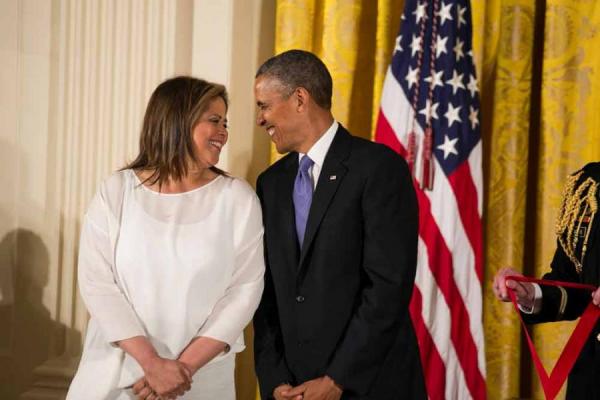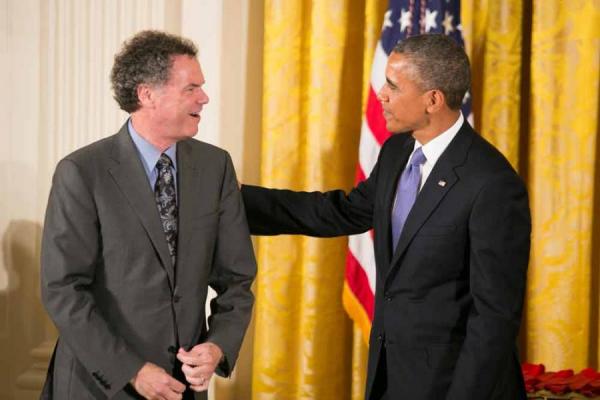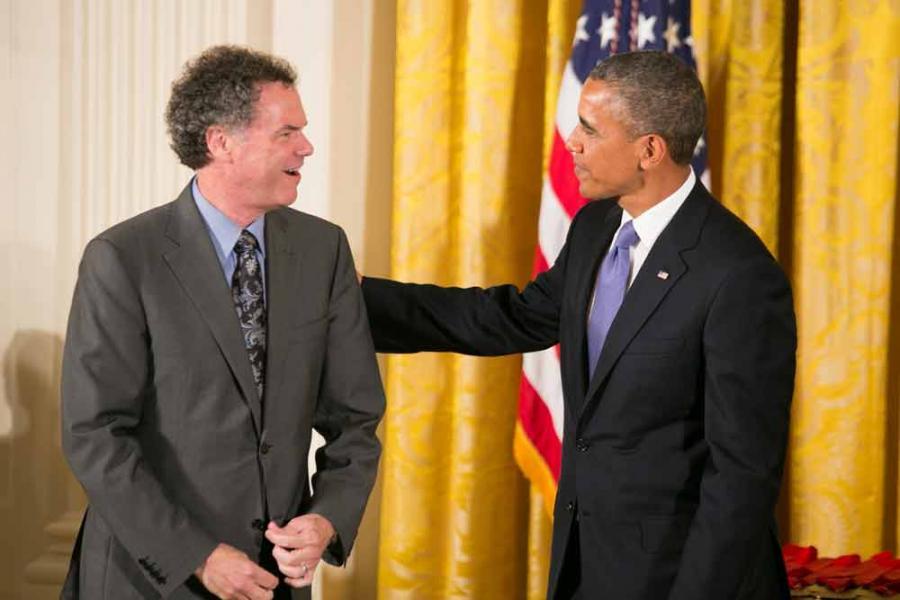President Obama Awards 2012 National Humanities Medals
A Poet Laureate, Pulitzer Prize-winning novelist, university presidents, literary journalist, preeminent political scientist, and urban documentarian among this year’s recipients

Anna Deavere Smith and President Obama, National Humanities Medals, July 10, 2013
Ralph Alswang

Anna Deavere Smith and President Obama, National Humanities Medals, July 10, 2013
Ralph Alswang
Watch video of the 2012 National Humanities Medals ceremony.
President Barack Obama presented the 2012 National Humanities Medals to twelve Americans today for their outstanding achievements in history, literature, higher education, social documentary and cultural criticism. Medals were given to historians Edward L. Ayers and Natalie Zemon Davis; academic leaders William G. Bowen and Jill Ker Conway; authors Joan Didion and Marilynne Robinson; sportswriter Frank Deford; political scientist Robert D. Putnam; poet Kay Ryan; editor Robert B. Silvers; actress and playwright Anna Deavere Smith; and photographer Camilo José Vergara.
The National Humanities Medal honors individuals or groups whose work has deepened the nation’s understanding of the humanities, broadened our citizens’ engagement with the humanities, or helped preserve and expand Americans’ access to important resources in the humanities.
The official citations honoring the medalists are:
- Edward L. Ayers, historian, for his commitment to making our history as widely available and accessible as possible. Dr. Ayers’ innovations in digital humanities extend higher learning beyond campus boundaries and allow broad audiences to discover the past in new ways. (Read profile.)
- William G. Bowen, academic leader, for his contributions to the study of economics and his probing research on higher education in America. While his widely discussed publications have scrutinized the effects of policy, Dr. Bowen has used his leadership to put theories into practice and strive for new heights of academic excellence. (Read profile.)
- Jill Ker Conway, author and leader in higher education, for her contributions as a historian and trailblazing academic leader. Dr. Conway has inspired generations of scholars, and her studies of exceptional and empowered women have revealed a common drive that unites women across the globe—to create, to lead, and to excel. (Read profile.)
- Natalie Zemon Davis, historian, for her insights into the study of history and her exacting eloquence in bringing the past into focus. With vivid description and exhaustive research, her works allow us to experience life through our ancestors’ eyes and to truly engage with our history. (Read profile.)
- Frank Deford, sports writer, for transforming how we think about sports. A dedicated writer and storyteller, Mr. Deford has offered a consistent, compelling voice in print and on radio, reaching beyond scores and statistics to reveal the humanity woven into the games we love. (Read profile.)
- Joan Didion, novelist and essayist, for her mastery of style in writing. Exploring the culture around us and exposing the depths of sorrow, Ms. Didion has produced works of startling honesty and fierce intellect, rendered personal stories individual, and illuminated the seemingly peripheral details that are central to our lives. (Read profile.)
- Robert D. Putnam, political scientist, for deepening our understanding of community in America. Examining how patterns of engagement divide and unite, Dr. Putnam’s writing and research inspire us to improve institutions that make society worth living in, and his insights challenge us to be better citizens. (Read profile.)
- Marilynne Robinson, novelist, for her grace and intelligence in writing. With moral strength and lyrical clarity, Dr. Robinson’s novels and nonfiction have traced our ethical connections to people in our lives, explore the world we inhabit, and defined universal truths about what it means to be human. (Read profile.)
- Kay Ryan, poet, for her contributions as a poet and educator. A former Poet Laureate of the United States, her witty and compact verse infused with subtle wordplay reminds us of the power of language to evoke wisdom from the ordinary. (Read profile.)
- Robert B. Silvers, editor, for offering critical perspectives on writing. As the editor and co-founder of The New York Review of Books, he has invigorated our literature with cultural and political commentary and elevated the book review to a literary art form. (Read profile.)
- Anna Deavere Smith, actress and playwright, for her portrayal of authentic American voices. Through profound performances and plays that blend theater and journalism, she has informed our understanding of social issues and conveyed a range of disparate characters. (Read profile.)
- Camilo José Vergara, photographer and documentarian, for his stark visual representation of American cities. By capturing images of urban settings over time, his sequences reflect the vibrant culture of our changing communities and document the enduring spirit that shines through decay. (Read profile.)
The medals, first awarded as the Charles Frankel Prize in 1989, were be presented during a ceremony in the East Room of the White House. Video of the ceremony is available here.
Since 1996, when the first National Humanities Medal was given, 145 individuals have been honored, inclusive of this year's awardees. Ten organizations also received medals. Previous medalists include Pulitzer Prize winner Philip Roth, Nobel Prize winner Toni Morrison, novelist John Updike, Nobel Peace Prize laureate Elie Wiesel, sociologist Robert Coles, and filmmaker Steven Spielberg. A complete list of previous honorees is available at: http://www.neh.gov/about/awards/national-humanities-medals

